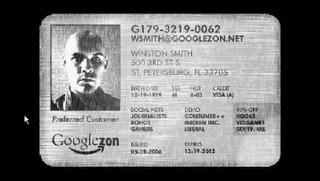
One of my favorite movies in the 1990s was
Quiz Show. As part of the generation who grew up with the constant hum of television, it was an interesting movie to think with. I was reminded of it when I saw
Good Night, and Good Luck because it had once again made me consider the possibilities of television as a medium. It also made me reconsider the ways that television had failed us. After listening to the remarks made by Murrow toward the end of
Good Night, and Good Luck, I found myself thinking about what an amazing tool television can and could have been for democracy and education. Instead it has become so filled with programming that my roommate may watch shows I have never heard of. We have become so overwhelmed by television and its persistent hum in our lives that we actually crave television that claims to mimic “reality.” I feel much as Goodwin does near the completion of
Quiz Show: “I thought we were gonna get television. The truth is... television is gonna get us.”
I have found myself wondering the same about the internet these past few years. On the one hand, I love the internet. It allows me to write this to the two of you who read it. Google itself provided the amazing tool of “Google Scholar,” which I use far too often in doing research at the Institute. I read a lot of
New York Times’ articles online. I am able to be in touch with friends from years ago who live in other countries. So I admit, the internet is an amazing thing. Yet sometimes I worry about its capacity to become just another part of the distracting noise that has been occupied by television and
Enterntainment Weekly. This is why I enjoyed watching the science fiction product describing
EPIC, the imagined ultimate creation of the futuristic mega-corporation, Googlezon. If you haven’t seen this movie yet, then I highly recommend you check out the
Museum of Media History clip to see the video.
In this same vein, a movie has become really popular on the internet lately for mocking My Space, the online community website that looks like “Friendster” (which is referenced in the EPIC video) on crack. The maker of
My Space - the Movie may not have realized what he was doing when he made it, but he did a good job of mocking a few of things about My Space that really bug me.
My friend Melody was showing me some of the pages for a couple of these girls on My Space who have gotten some minor fame out of taking photos of themselves in revealing clothing. What interested me most about the more famous of the two was her online poetry describing herself as a “real” person. I cannot help but wonder if it is only in a world where “reality” exists only in pre-fabricated images bombarding us on television and through the fantastic internet, if it is only in this world that we could crave the “real” so much. I recognize that the quest of individual “authenticity” has been such an odd part of modernity (a la John Berger and the discussion of the ability to make prints of art); that it has been frequently commented upon since the boom of 1950s consumer culture. It has also been an obsession in the U.S.A. in particular. People are always complimenting others by saying, wow, “she’s so real.” The irony far too often is that we are not real, authentic, or original. These girls on MySpace are but sad reproductions of the media-produced Paris Hilton, Britney Spears, etc., all of whom are empty products themselves (on those kind of terms; in Buddhist terms, we’re all empty). Only on MySpace could these girls plead their reality while at the same time demonstrating in photograph after photograph their unoriginal creation.
